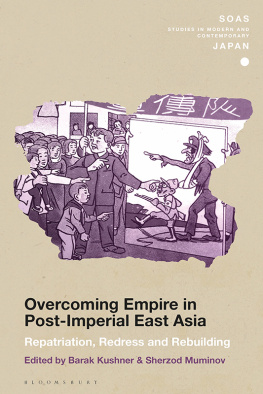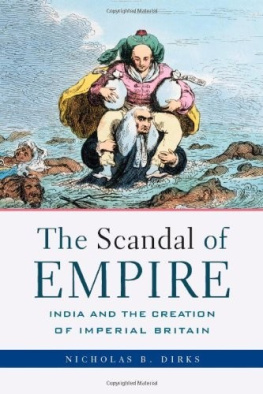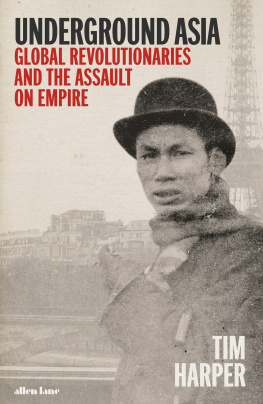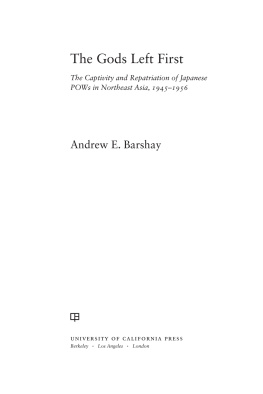Sherzod Muminov - Overcoming empire in post-Imperial East Asia : repatriation, redressand rebuilding
Here you can read online Sherzod Muminov - Overcoming empire in post-Imperial East Asia : repatriation, redressand rebuilding full text of the book (entire story) in english for free. Download pdf and epub, get meaning, cover and reviews about this ebook. year: 2020, publisher: Bloomsbury UK, genre: Politics. Description of the work, (preface) as well as reviews are available. Best literature library LitArk.com created for fans of good reading and offers a wide selection of genres:
Romance novel
Science fiction
Adventure
Detective
Science
History
Home and family
Prose
Art
Politics
Computer
Non-fiction
Religion
Business
Children
Humor
Choose a favorite category and find really read worthwhile books. Enjoy immersion in the world of imagination, feel the emotions of the characters or learn something new for yourself, make an fascinating discovery.
- Book:Overcoming empire in post-Imperial East Asia : repatriation, redressand rebuilding
- Author:
- Publisher:Bloomsbury UK
- Genre:
- Year:2020
- Rating:5 / 5
- Favourites:Add to favourites
- Your mark:
- 100
- 1
- 2
- 3
- 4
- 5
Overcoming empire in post-Imperial East Asia : repatriation, redressand rebuilding: summary, description and annotation
We offer to read an annotation, description, summary or preface (depends on what the author of the book "Overcoming empire in post-Imperial East Asia : repatriation, redressand rebuilding" wrote himself). If you haven't found the necessary information about the book — write in the comments, we will try to find it.
Sherzod Muminov: author's other books
Who wrote Overcoming empire in post-Imperial East Asia : repatriation, redressand rebuilding? Find out the surname, the name of the author of the book and a list of all author's works by series.
Overcoming empire in post-Imperial East Asia : repatriation, redressand rebuilding — read online for free the complete book (whole text) full work
Below is the text of the book, divided by pages. System saving the place of the last page read, allows you to conveniently read the book "Overcoming empire in post-Imperial East Asia : repatriation, redressand rebuilding" online for free, without having to search again every time where you left off. Put a bookmark, and you can go to the page where you finished reading at any time.
Font size:
Interval:
Bookmark:
OVERCOMING EMPIRE IN POST-IMPERIAL EAST ASIA
SOAS Studies in Modern and Contemporary Japan
SERIES EDITOR:
Christopher Gerteis (SOAS, University of London, UK)
EDITORIAL BOARD:
Stephen Dodd (SOAS, University of London, UK)
Andrew Gerstle (SOAS, University of London, UK)
Janet Hunter (London School of Economics, UK)
Barak Kushner (University of Cambridge, UK)
Helen Macnaughtan (SOAS, University of London, UK)
Aaron W. Moore (University of Edinburgh, UK)
Timon Screech (SOAS, University of London, UK)
Naoko Shimazu (NUS-Yale College, Singapore)
Published in association with the Japan Research Centre at the School of Oriental and African Studies, University of London, UK.
SOAS Studies in Modern and Contemporary Japan features scholarly books on modern and contemporary Japan, showcasing new research monographs as well as translations of scholarship not previously available in English. Its goal is to ensure that current, high quality research on Japan, its history, politics and culture, is made available to an English speaking audience.
Published:
Women and Democracy in Cold War Japan, Jan Bardsley
Christianity and Imperialism in Modern Japan, Emily Anderson
The China Problem in Postwar Japan, Robert Hoppens
Media, Propaganda and Politics in 20th-Century Japan,The Asahi Shimbun Company (translated by Barak Kushner)
Contemporary Sino-Japanese Relations on Screen, Griseldis Kirsch
Debating Otaku in Contemporary Japan, edited by Patrick W. Galbraith, Thiam Huat Kam and Bjrn-Ole Kamm
Politics and Power in Twentieth-Century Japan, Mikuriya Takashi and Nakamura Takafusa (translated by Timothy S. George)
Japanese Taiwan, edited by Andrew D. Morris
Japans Postwar Military and Civil Society, Tomoyuki Sasaki
The History of Japanese Psychology, Brian J. McVeigh
Postwar Emigration to South America from Japan and the Ryukyu Islands, Pedro Iacobelli
Selected Essays by Fukuzawa Yukichi, Albert M. Craig (translated by Teruko Craig)
The Uses of Literature in Modern Japan, Sari Kawana
Post-Fascist Japan, Laura Hein
Mass Media, Consumerism and National Identity in Postwar Japan, Martyn David Smith
Japans Occupation of Java in the Second World War, Ethan Mark
Gathering for Tea in Modern Japan, Taka Oshikiri
Engineering Asia, Hiromi Mizuno, Aaron S. Moore and John DiMoia
Automobility and the City in Twentieth-Century Japan and Britain, Simon Gunn and Susan C. Townsend
The Origins of Modern Japanese Bureaucracy, Yuichiro Shimizu (translated by Amin Ghadimi)
Kenkoku University and the Experience of Pan-Asianism, Yuka Hiruma Kishida
Forthcoming:
Gender, Culture, and Disaster in Post-3.11 Japan, Mire Koikari
OVERCOMING EMPIRE IN POST-IMPERIAL EAST ASIA
Repatriation, Redress and Rebuilding
Barak Kushner,
University of Cambridge
and
Sherzod Muminov,
University of East Anglia

Figures
Tables
CHANG Chihyun
Chang Chihyun received his doctorate from the University of Bristol, with a thesis on the Chinese Maritime Customs Service, focusing on Chinese nationalism and the foreign colonial presence in China. In 2010 he joined the Center for Geographic Information Science and in 2011 the Institute of Modern History at Academia Sinica as a postdoctoral fellow, where he continued his study of modern China and imperial maritime customs and trade. He later accepted the offer of a research fellowship from the Department of History at Shanghai Jiao Tong University in Shanghai. He has published Government, Nationalism and Imperialism in China (2013) and The L. K. Little Diaries, 19431954: The Witness of Chinese Revolutions and Wars (2016).
Arnaud DOGLIA
Arnaud Doglia is currently a postdoctoral research fellow in the Department of East Asian Studies at the University of Geneva, Switzerland. He is interested in contemporary Japan and East Asia. He received his MA (East Asian studies) and his PhD (Japanese studies) from the University of Geneva. His first book, published by Peter Lang, is entitled Japanese Biological Warfare, 18802011: Historical Realities and the Anatomy of Memory (2016). His current research, Japanese Medical Atrocities: Narratives of Reconversion of Former War Criminals in Postwar Japan, seeks to analyze in depth the network of scientists and physicians who participated in medical experiments until 1945, equally discussing their profile, reconversion and responsibility. Other topics of interest include the birth of bioethics in Japan, Japanese war crimes and their memories in East Asia, the Second World War and Cold War atrocities as well as social history and popular culture during the Allied Occupation and in postwar Japan.
Koji HIRATA
Koji Hirata is a research fellow of Emmanuel College, Cambridge. His research centers on the history of industry, city, empires, and globalization in modern China. His current book project, Steel Metropolis: Industrial Manchuria and the Making of Chinese Socialism, 19171975, examines the development of state-owned enterprises, the concepts and practice of urban planning, and the politics of everyday life among workers in twentieth-century China. Methodologically, his research combines examination of economic activities informed by the literature on political economy, a cultural history analysis of the language used in historical texts, and a transnational history approach to the movement of ideas, goods, and people across national boundaries. His dissertation makes use of archival documents in Chinese, Japanese, English, and Russian as well as oral history interviews.
Matthew D. JOHNSON
Matthew D. Johnson is an associate fellow of the Global Diplomatic Forum, an independent political analyst, and a higher education consultant. Previously, he was Executive Dean of the Faculty of Arts and Social Sciences at Taylors University, Malaysia, and served on the board of the Malaysian-American Commission on Educational Exchange. He is a co-founder and director of the PRC History Group (http://prchistory.org/) and board member (at-large) of the Historical Society for Twentieth-Century China. His publications include Maoism at the Grassroots: Everyday Life in Chinas Era of High Socialism (co-edited with Jeremy Brown, 2015) and a forthcoming chapter on PRC responses to US cultural diplomacy and global strategy during the Kennedy administration.
Yukiko KOGA
Yukiko Koga is Associate Professor in the Department of Anthropology at Hunter College at the City University of New York, CUNY Graduate Center, and Associate Research Scholar at the Weatherhead East Asian Institute at Columbia University. She is the author of the award winning Inheritance of Loss: China, Japan, and the Political Economy of Redemption after Empire (2016), which explores how the introduction of the market-oriented economy in China created new dynamics concerning the contested yet under-explored past for both the Chinese and Japanese. Whereas Inheritance of Loss is set within the burgeoning economic sphere of Northeast China to explore the generational transmission of unaccounted for pasts stemming from Japanese imperialism in China, her book-in-progress takes place within a transnational legal sphere. She is currently completing a book entitled Post-imperial Reckoning: Law, Redress, Reconciliation
Next pageFont size:
Interval:
Bookmark:
Similar books «Overcoming empire in post-Imperial East Asia : repatriation, redressand rebuilding»
Look at similar books to Overcoming empire in post-Imperial East Asia : repatriation, redressand rebuilding. We have selected literature similar in name and meaning in the hope of providing readers with more options to find new, interesting, not yet read works.
Discussion, reviews of the book Overcoming empire in post-Imperial East Asia : repatriation, redressand rebuilding and just readers' own opinions. Leave your comments, write what you think about the work, its meaning or the main characters. Specify what exactly you liked and what you didn't like, and why you think so.





